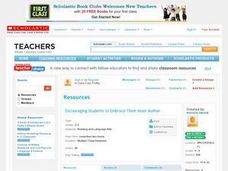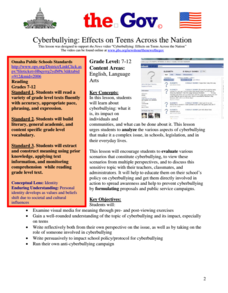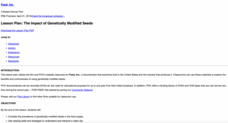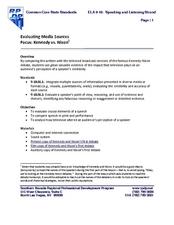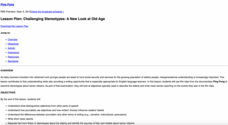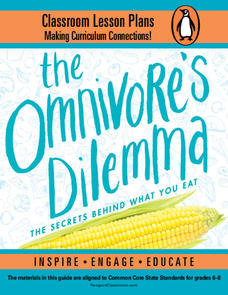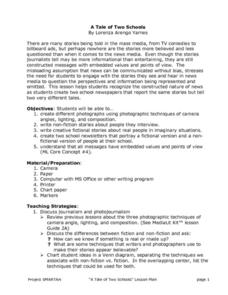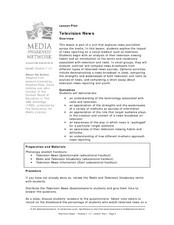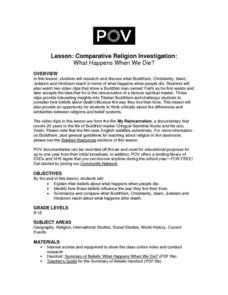Curated OER
Encouraging Students to Embrace Their Inner Author
Everyone is a writer! Youngsters compose an original piece of writing. In this writing lesson plan, they come up with their own idea for a piece of writing, revise it, and then publish it with illustrations. This lesson plan includes...
Deliberating in a Democracy
Free and Independent Press
Students determine how free press principles can be compromised. For this global studies lesson plan, students read an article titled "Free and Independent Press." Students respond to discussion questions regarding the article.
Curated OER
Oxford Compiles Top 10 Irritating Phrases
Explore well-known expressions that are frequently used. Middle schoolers read an article with the author's opinion of the most annoying phrases. Afterward, they complete numerous activities that check their reading comprehension. Some...
Curated OER
Everyone's a Critic: Analyzing Sitcoms as Cultural Texts
Start by defining the word sitcom with the goal of launching a discussion. What exactly is a sitcom? How is a sitcom different from sketch comedy, drama, and reality television? Class members give examples, remember storylines...
Curated OER
Confucianism in a Changing Society
A great lesson promotes thoughtful discussion, global perspectives, and links between economics and culture. Learners view four clips showing how Confucian teachings have shaped Chinese culture and how filial piety plays a role in...
Curated OER
Cyberbullying: Effects on Teens Across the Nation (Segment 3)
Free speech, privacy, and cyberbullying are the focus of a series of activities that prompt class members to engage in discussions about these interrelated topics. They view a segment from PBS’s series on bullying, read...
PBS
U.S. Agricultural Subsidies and Nutrition
Most young people don't spend a lot of time thinking about why some foods cost less than others. This resource uses clips from the documentary, Food, Inc. to explore the impact of agricultural subsidies on nutrition, health, and the...
PBS
The Impact of Genetically Modified Seeds
What is all the fuss about genetically modified foods? PBS provides this resource designed to supplement the documentary Food, Inc. to help learners investigate the benefits and controversies of genetically modified foods...
PBS
Exploring Parent-Child Relationships Through Letter Writing
The PBS film, Bronx Princess, launches a study of complex parent-child relationships. Using the provided reading guide, viewers respond to clips from the film and compare Rocky and Yaa’s relationship to other parent-child relationships....
Southern Nevada Regional Professional Development Program
Evaluating Media Sources
Just how much influence did television have on the results of the 1960 presidential election? Media critics contend that the results were all about how the two candidates appeared on the screen. Give your young historians a chance to...
Curated OER
Challenging Stereotypes: A New Look at Old Age
Combine a lesson on the elderly with grammar instruction. Before viewing a series of provided video clips, class members brainstorm a list of words related to senior citizens and organize these words into categories that correspond with...
American Documentary
Religion in Culture & Politics: Women’s empowerment in Syria
What defines a woman as empowered, and how does this definition compare to the ideas and actions of a group of Muslim women in Syria? After watching a series of video clips from a documentary film about a school for girls in Damascus,...
PBS
Evolution of the Presidency: Theodore Roosevelt to Franklin D. Roosevelt
How much power should a president be allowed to exert? Theodore Roosevelt and Franklin D. Roosevelt exercised their power according to their interpretations of the United States Constitution, and these interpretations affected the...
PBS
Lessons in Leadership, Roosevelt Style
It's easy to criticize those in power until you're sitting at their desk, faced with the same decisions. A history lesson prompts secondary learners to research the Roosevelt presidencies through the lens of leadership and...
PBS
WWII: Detained
Imagine being forced against your will behind barbed wire for doing nothing but being yourself. Scholars investigate the impact Japanese-American internment camps had during World War II. Through video and archival evidence, they create...
Google
Animation: Studio Logo
Logos just make a club seem more fun. Scholars incorporate knowledge from previous lessons in the unit to write a computer program in the Scratch block-based language. Their program should help design a logo for the CS First studio. A...
Penguin Books
The Omnivore’s Dilemma, Young Readers Edition
As the saying goes, you are what you eat. A useful set of lesson plans encourage young readers to take a second look at their eating habits. Pre- and post-reading questions bring in reflective writing and discussion while extension...
Curated OER
Freedom by the Fireside: The Legacy of FDR's "Four Freedoms" Speech
Middle schoolers read and analyze Franklin Delano Roosevelt's 1941 State of the Union Address. They listen to recordings of speeches by F.D.R., answer discussion questions, and participate in a debate.
Curated OER
Learning From World War II and Connecting It to the Present
Compare and contrast World War II to the modern Iraq war with this instructional activity. After watching a film, learners use supporting evidence to support their point of view of the conflicts. Using the internet, they create a...
Curated OER
A Tale of Two Schools
Learners create different photographs using photographic techniques of camera angles, lighting, and composition. They write non-fiction stories about people they interview and create two school newsletters that portray a fictional...
Media Smarts
Looking at Newspapers: Introduction
A scavenger hunt introduces class groups to the different sections of newspapers and the different types of articles found in each section.
Curated OER
Television News
Different media sources portray news in a variety of ways. In groups of three, learners look at different news sources, bringing in all the findings the next day. Three handouts help scholars compare sources, define specific terms used...
American Documentary
Comparative Religion Investigation: What Happens When We Die?
How do different religions offer explanations for what happens when we die? Invite your learners to consider the variance and complexity of religious beliefs, and to research and compare/contrast the concept of death and afterlife...
NASA
The Case of the Wacky Water Cycle
Join the tree house detectives in learning about the processes of the water cycle, water conservation, water treatment, and water as a limited resource.
Other popular searches
- Broadcast Journalism
- Yellow Journalism
- Journalism School Newspapers
- Journalism Layout
- Journalism Lesson Plans
- Investigative Journalism
- Photo Journalism
- Broadcast
- Journalism Introduction
- Journalism History
- Radio Broadcast
- Journalism and the Media
